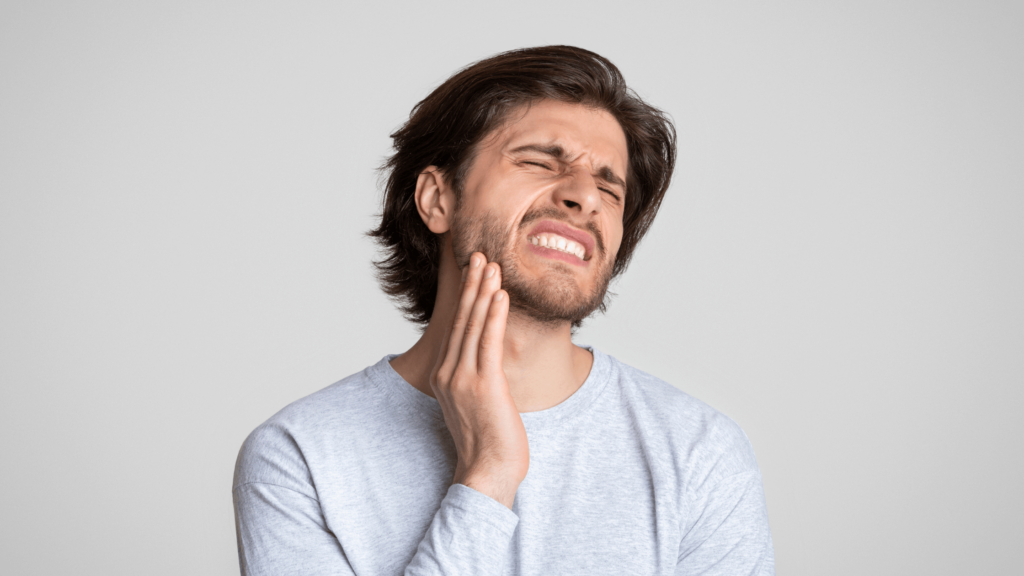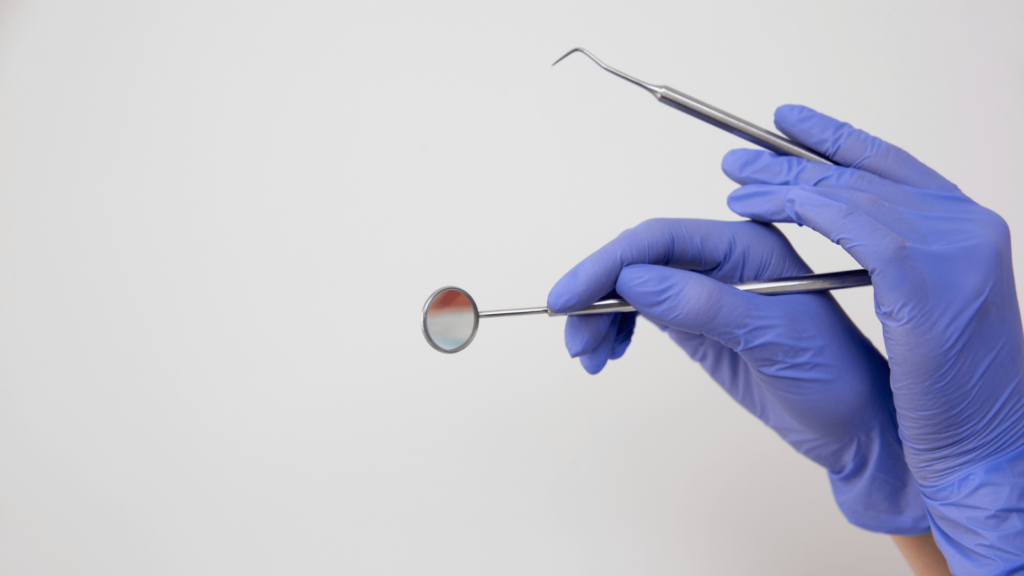After a long day on the job site, you might experience sore arms, an aching lower back, and… jaw pain? Also known as bruxism, jaw clenching is a habit you might not even realize you’re doing. Many people subconsciously grit their teeth during the day or tense their jaw during high-concentration tasks like operating heavy machinery in tight spaces. Others grind their teeth at night, causing damage to teeth and pain in the jaw. Bruxism can be caused by consuming caffeine, alcohol, nicotine, or certain medications or due to stress and anxiety. Try relaxation techniques, dental interventions, and mouthguards to prevent jaw clenching.
Quick look
- Bruxism involves clenching or grinding the teeth. It can occur during the day or while sleeping.
- Bruxism can occur due to teeth misalignment, medications, stress, and sleep. Stress and anxiety can also cause bruxism.
- Symptoms of jaw clenching include sore muscles, chipped teeth, and grinding sounds.
- Strategies for stopping jaw clenching include stress-reduction techniques, dental visits, mouthguards, and healthy lifestyle habits.
What is bruxism (jaw clenching)?
Bruxism involves involuntarily tightening and clenching your jaw or grinding your teeth. Many people who have bruxism don’t know they’re doing it—in some cases, the only indicators are sore jaw muscles or aching teeth. Some experience bruxism only at night, grinding or clenching their teeth while they sleep, and others may find that they experience jaw tension and clenching throughout the day, as well.
Why do some people clench their jaws?
Several factors can contribute to jaw clenching, including teeth alignment, lifestyle factors, sleep, medication, and stress.
Misaligned teeth can create abnormal bite patterns, putting uneven pressure on the teeth and increasing the risk of bruxism. Lifestyle factors also play a role—consuming alcohol, caffeine, and nicotine all increase the likelihood of jaw clenching. Even prescription medication can have an effect. Studies have shown that medications for several different disorders can cause bruxism, including:
- Anticonvulsants
- ADHD medications
- SSRI antidepressants
- Methadone
Clenching your jaw or grinding your teeth at night often occurs due to one (or several) of the abovementioned factors. Sleep disorders can also contribute to the condition, with obstructive sleep apnea almost always resulting in bruxism. Jaw clenching and tightness while awake can frequently be caused by situational factors, such as stressful situations or tasks requiring intense concentration.
Jaw clenching and stress/anxiety
Studies have shown that people who are stressed are more likely to experience bruxism, indicating the role that emotional states can play in this condition. Tense, stressful, or anxiety-provoking situations can cause you to clench your jaw or grind your teeth. When these conditions are chronic, bruxism can become habitual, causing tension to accumulate in your jaw and jaw muscles.
Signs and symptoms of jaw clenching

It can be challenging to know if you’re clenching your jaw—especially if it happens at night. Bruxism is involuntary and often flies under the radar even when it takes place during daylight hours. There are some telltale signs that you have bruxism, however, including sore jaw muscles, damaged teeth, and grinding sounds.
Sore jaw muscles
If you’ve been lifting bags of cement all day on the job site, you’ll feel it in your arms and shoulders the next day. Similarly, bruxism takes a toll on the muscles of your jaw, neck, and face. Soreness is often one of the first signs of bruxism. If you wake up with a sore jaw, neck, or teeth, you may be grinding or clenching your jaw while you sleep. Feeling a tight jaw after an intense meeting or long workday might indicate that you’re holding tension in your jaw and inadvertently tightening or clenching it.
Chipped teeth
Bruxism doesn’t just take a toll on your jaw muscles; it can also affect your teeth. Grinding your teeth while you sleep can cause cracks and chips and wear down their biting surfaces. Constantly clenching your jaw can cause the surfaces of your teeth to become flattened. Regular dentist visits can help identify whether you have bruxism and if it’s causing damage to your teeth.
Grinding sounds
If you have a partner, they might be able to notice you grinding your teeth at night simply by the sound. Jaw clenching is silent, but the sound of your teeth being ground together is distinctive. If you suspect you have nocturnal bruxism, ask your spouse whether they ever hear you grinding your teeth.
How to stop clenching your jaw

When you become aware of clenching your jaw or grinding your teeth, you may be surprised at how frequently you do it. Whether you notice this habit or not, there are several steps you can take to reduce or eliminate bruxism.
1. Incorporate daytime stress reduction techniques
Stress is a major contributor to jaw clenching and teeth grinding, and techniques designed to reduce stress and relieve tension can also help you address bruxism. Mindfulness techniques like meditation and mindful walking can effectively reduce overall stress—a 2019 study showed that mindfulness-based stress reduction reduced the amount of stress participants felt and increased their sense of well-being and job satisfaction. However, the most effective stress-reduction technique is the one you can commit to doing regularly. Take a walk outside, listen to your favorite music, or participate in a hobby or sport you enjoy—anything that relaxes you and makes you feel less stressed.
2. Visit your dentist
Regular dental checkups can help diagnose bruxism, identify any damage it’s causing to your teeth, and help you stop clenching your jaw. If misaligned teeth are causing your bruxism, your dentist may be able to correct the issue and realign your bite. Fitting you with a custom mouthguard may also help reduce nighttime teeth grinding and ease the stress on your jaw.
3. Wear a mouthguard
If you don’t have health insurance, you might put off a visit to the dentist due to the cost involved. However, even if you don’t have a dentist, you can still ease the stress on your teeth and jaw by wearing a mouthguard. Purchasing an over-the-counter mouthguard isn’t as effective as one custom-fitted to your teeth, but it will still help prevent nighttime teeth grinding and jaw clenching. Some products allow options for creating a better fit for your mouth, while others come in standard sizes to cushion the teeth and relieve the impact of your teeth.
4. Adopt healthy lifestyle habits
Habits like smoking, drinking, and consuming caffeine can cause or exacerbate bruxism. Fortunately, these habits are within your control. Reducing the amount of caffeine, alcohol, and nicotine you consume can also reduce the wear and tear on your jaw and improve your overall health.
Bottom line
Jaw-clenching and teeth grinding can damage your teeth and exhaust the muscles of your face and jaw. Whether your jaw clenching is due to stress, medication, teeth misalignment, or consuming substances like alcohol, tobacco, and caffeine, you can take steps to address it. Adopting stress-reduction techniques, visiting your dentist to diagnose underlying issues, and adopting healthy lifestyle habits can all help reduce jaw clenching and keep your teeth healthy and strong.
Sign up for our newsletter and follow us on social media for more ways to stay healthy under the hard hat!


